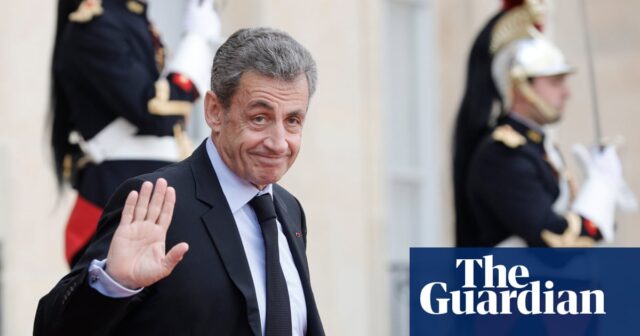The former French president Nicolas Sarkozy will go on trial on Monday over the biggest political financing scandal in modern French history, in which he is alleged to have received millions of euros in illegal election campaign funding from the regime of the late Libyan dictator Muammar Gaddafi.
The historic trial of the rightwing former French president and 12 other people – including three former government ministers – for criminal conspiracy to receive funds from a foreign dictator on a massive scale threatens to worsen voters’ already low trust in the French political class.
After a 10-year anti-corruption investigation, the court will hear allegations of what investigative magistrates called a “corruption pact” forged between Sarkozy and the Libyan regime in which intermediaries delivered suitcases full of cash to ministry buildings in Paris to illegally fund Sarkozy’s victorious 2007 presidential campaign.
The court will examine whether, in exchange for funding Sarkozy’s presidential campaign, the Libyan regime requested diplomatic, legal and business favours.
One of these alleged requests for favours related to Abdullah al-Senussi, Gaddafi’s spy chief and enforcer. Senussi had been sentenced in absentia to life imprisonment by a French court in 1999 for his role in the 1989 bombing of a UTA passenger plane over Niger which killed 170 people. The court will hear how requests were allegedly made by the Libyan regime to Sarkozy’s entourage to find a way to lift France’s international arrest warrant against Senussi.
Laure Heinich, a lawyer for 15 relatives of people killed in the UTA plane bombing, said her clients would tell the court of their shock to hear that “the arrest of the person who killed their family members” could be “exchanged for money”. She said the alleged corruption pact would mean that “the money Nicolas Sarkozy used to get elected in 2007 was money sullied by these families’ blood”.
Sarkozy, who was president between 2007 and 2012, has denied all wrongdoing in the case.
The three-month trial will unpick Sarkozy’s complex relationship with Gaddafi, the autocratic Libyan leader whose brutal 41-year rule was marked by human rights abuses and who had been isolated internationally over his regime’s connection to terrorism, including the bombing of Pan Am flight 103 over Lockerbie in Scotland in December 1988.
Members of Sarkozy’s entourage allegedly met members of Gaddafi’s regime in Libya in 2005, when Sarkozy was interior minister. Soon after becoming French president in 2007, Sarkozy then invited the Libyan leader for a lengthy state visit to Paris, setting up his Bedouin tent in gardens near the Élysée. Sarkozy was the first western leader to welcome Gaddafi on a full state visit since the freeze in relations in the 1980s over his pariah status as a sponsor of state terrorism.
But in 2011, Sarkozy put France in the forefront of Nato-led airstrikes against Gaddafi’s troops that helped rebel fighters topple his regime. Gaddafi was captured by rebels in October 2011 and killed.
A documentary about the case, Personne N’y Comprend Rien (No One Understands), will be released in French cinemas on Wednesday telling the story of the investigation.
If convicted on corruption charges, Sarkozy could face up to 10 years in prison alongside Claude Guéant, a former Élysée secretary general and interior minister, and Brice Hortefeux, a close Sarkozy ally who also served as interior minister. All deny wrongdoing.
after newsletter promotion
Also on trial is Sarkozy’s former budget minister Éric Woerth, who is now an MP for Emmanuel Macron’s centrist party. He denies wrongdoing.
In March 2011, Gaddafi’s son Saif al-Islam Gaddafi told Euronews: “Sarkozy has to give back the money he accepted from Libya to finance his electoral campaign. We financed his campaign and we have the proof … The first thing we’re demanding is that this clown gives back the money to the Libyan people.”
Chanez Mensous of the anti-corruption group Sherpa, which is a civil party in the trial, said: “This case gives us a very clear view of what transnational corruption is today and its implications. Something not often stressed enough is the damage caused to civil populations, namely the Libyan population, because this is about the embezzlement of Libyan public money.”
Sarkozy already has two court convictions. Last month, France’s highest court confirmed a verdict against him for corruption and influence peddling over illegal attempts to secure favours from a judge. He has been ordered to wear an electronic tag for a year, a first for a former head of state. He is challenging the ruling at the European court for human rights.
In a separate trial, Sarkozy was convicted of hiding illegal overspending in the 2012 presidential election that he lost to the Socialist candidate, François Hollande. He has appealed.
Fabrice Arfi, an investigative journalist for the website Mediapart, which broke the story in 2011, said the magnitude of the corruption charges in the Libya case would be an “electric shock” for French society. “France’s whole image is at stake,” he said. “People will discover the compromising behaviour of an ex-president and his team with a terrible dictator, on a level that is diplomatic, economic, judicial and financial.”






